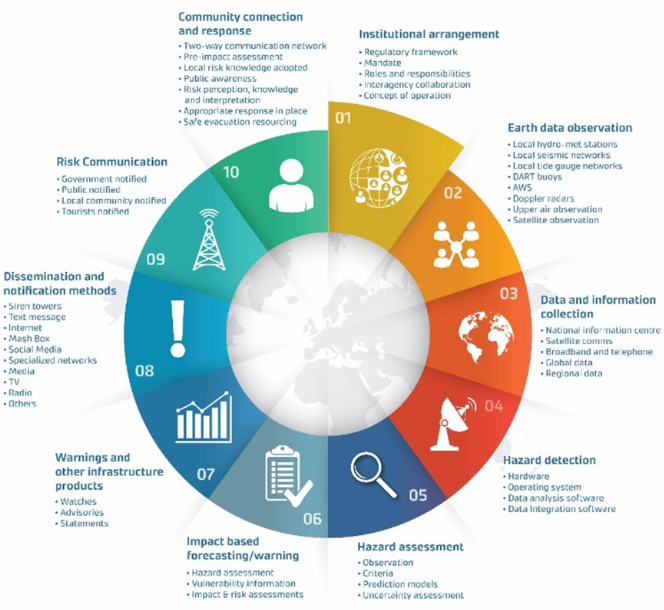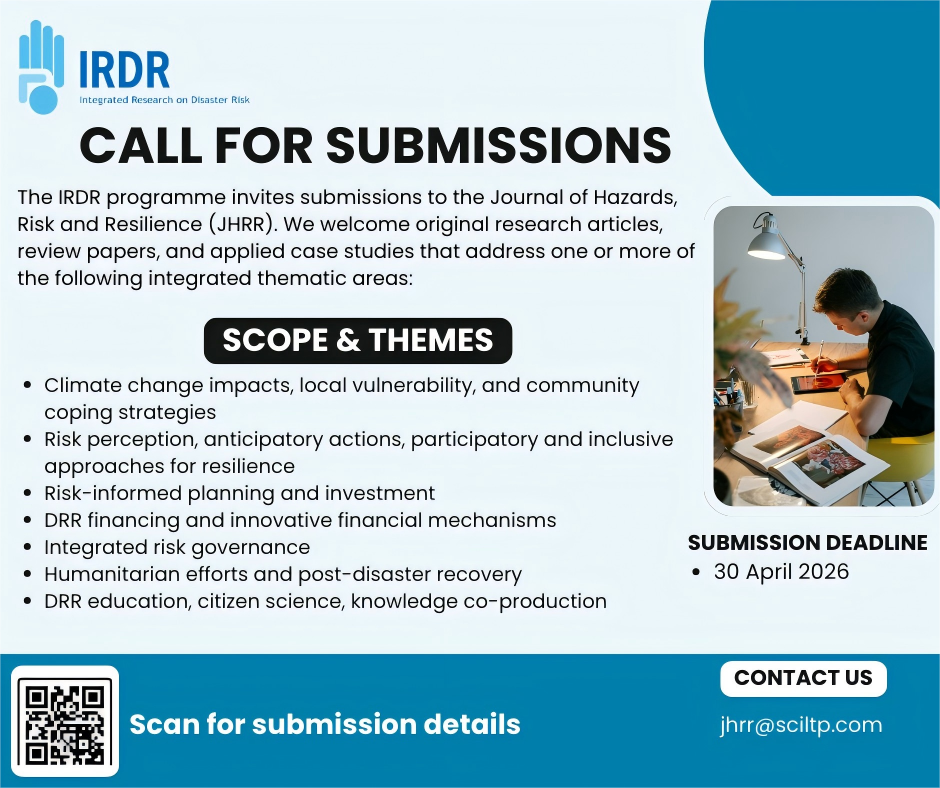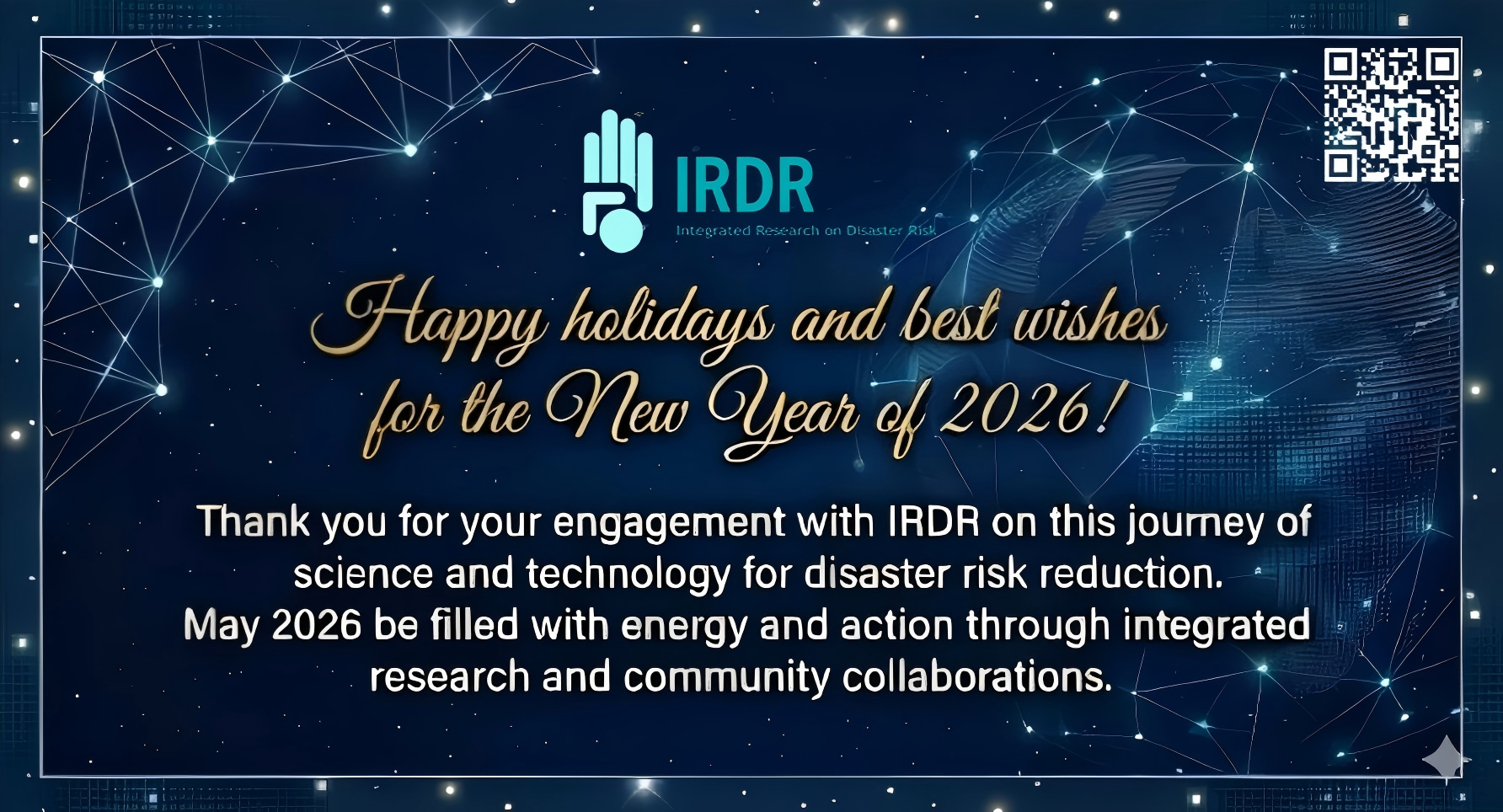Background
As the world celebrates 75 years of the World Meteorological Organization (WMO) on World Meteorological Day (March 24th), the Integrated Research on Disaster Risk (IRDR) reaffirms its commitment to climate action. Aligned with this year’s theme, "Closing the Early Warning Gap Together", IRDR promotes risk science to support the regional and national early warning related policies and actions. Through collaboration with specialized centers and regional partners, IRDR advances research and advocacy on inclusive, people-centered, and multi-hazard early warning systems, supporting the UN Early Warnings for All Initiative and Sendai Framework Target G.
IRDR’s contributions to multi-hazard early warning system
The IRDR community promoted early warning systems enabling clearer communication of the complex system of procedures and networks. The following cases came from different formats of scientific practice and collaboration i.e. IRDR Working Group, IRDR Flagship Project, IRDR National Committee and IRDR International Centre of Excellence. For a comprehensive overview of these contributions, refer to the IRDR Compilation 2010 –2020.
1. IRDR RIA Working Group: End-to-End Impact-Based Early Warning Systems
IIRDR, in collaboration with the World Meteorological Organization (WMO), the International Science Council (ISC), and Tonkin + Taylor International, has promoted a guideline-based end-to-end early warning system. This system comprises ten essential elements that work cohesively to create a robust warning framework. The concept has been successfully applied in several Asia-Pacific countries, including Somalia. [Reference: Somalia Case Study]

2. IRDR Flagship Project SiDRR: Marine Meteorological Disaster Prediction System
The SiDRR project developed a Marine Meteorological Disaster Prediction System for Sri Lanka and its surrounding waters. This system provides high-resolution, short-term forecasts, including 72-hour weather and ocean condition predictions (e.g., temperature, air pressure, heavy rain, waves, and storm surges). It also offers 15-day forecasts for the western Indian Ocean to the South China Sea at a 45km scale, and 0-72-hour forecasts for Sri Lanka and its surrounding regions at 15km and 5km scales.
3. IRDR ICoE SEADPRI-UKM: Kuala Lumpur Multi-Hazard Platform
The Kuala Lumpur Multi-Hazard Platform, developed by the IRDR International Centre of Excellence for Disaster Risk and Climate Extremes (IRDR ICoE-SEADPRI-UKM), is operational at the Emergency Response Department of Kuala Lumpur, Malaysia. This platform provides street-level forecasts for rainfall, temperature, wind, humidity, and air quality, serving as a transformative tool for disaster risk management. It is a key product of the project “Disaster Resilient Cities: Forecasting Local-Level Climate Extremes and Physical Hazards for Kuala Lumpur.”

4. IRDR NC Indonesia: Integrated Tsunami Research
The Indonesian Institute of Sciences (LIPI), host of IRDR National Committee Indonesia, has pioneered integrated tsunami research through its Community Preparedness (COMPRESS) Program. This transdisciplinary initiative adopted an end-to-end approach, encompassing hazard assessments, social and cultural research, policy development, and community preparedness. LIPI played a pivotal role in establishing the Indonesian Tsunami Warning System (InaTEWS) and the Landslide Warning System, influencing national and local disaster policies.
Way forward
In 2022, the International Day for Disaster Risk Reduction highlighted Target G of the Sendai Framework, which aims to “substantially increase the availability of and access to multi-hazard early warning systems (MHEWS) and disaster risk information and assessments to people by 2030.” The IRDR community actively contributed to this global effort by emphasizing the critical importance of MHEWS and calling for actionable steps to strengthen disaster resilience. Furthermore, the 2024 IRDR International Conference culminated in a declaration for science actions, proposing IRDR Work Streams and Pilot Studies focused on climate change and early warning systems. These initiatives highlight IRDR’s commitment to advancing scientific research and practical solutions for disaster risk reduction (DRR).
Moving forward, IRDR stresses the importance of sustained international cooperation among stakeholders in the DRR ecosystem to effectively adopt and implement early warning systems. By focusing on accelerating implementation, expanding global support, strengthening partnerships, enhancing regional capacity, and promoting national ownership, we can collectively advance early warning systems, mitigate the impacts of climate change, reduce vulnerabilities, and build resilience.





